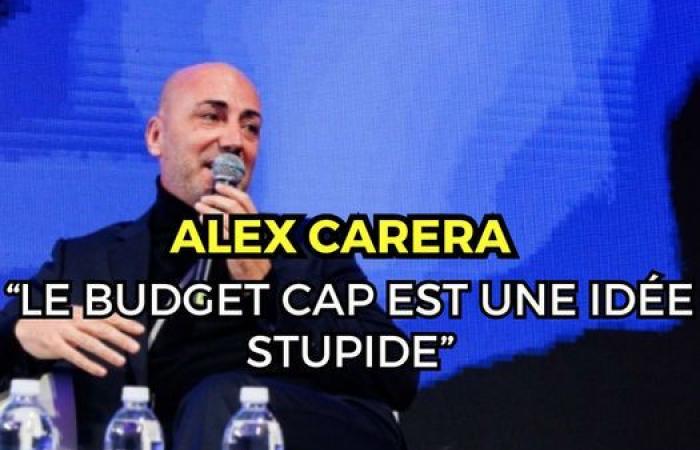While Maxim Van Gils has just officially signed up with RedBull Bora hansgrohe, Alex Carerahis new agent who made this transaction possible, gave us an exclusive interview in which he tells us about his journey, the cas Van Gils or his vision on the cap budget. An interview as fascinating as it is informative.
Friday evening, you were in Paris for the Vélo d'or, today you are announcing Maxim Van Gils' new team: it's a busy period, isn't it?
It's not just this time, there's something happening every month. Our company manages several athletes, but there are 12 of us and everything is under control. Of course I was in Paris with Tadej, but other members on my side are managing Maxim Van Gils, Isaac Del Toro or Jan Christen at the moment. When employees work well, we can do lots of things at the same time without problem.
It's a great team, and A&J All Sports is certainly the largest agent agency in Cycling…
In terms of numbers, no, I believe there are other agencies that have more riders under contract, but in terms of quality of riders, maybe. If you look at the top 100 runnersI think we have the most in our agency. We manage 3 of the top 10 for example. And for me, quality is more important than numbers.
How did you get there, exactly?
First, the relationship with each runner is different, because each runner is different. Every relationship is unique. In 2004, I was the agent of Gilberto Simoni and Damiano Cunego, who were both fighting for the pink jersey at the Giro. Why have I never had a problem with this? I always told them that I don't get involved in race programs or tactics or anything, so I can look after different runners who have the same goal. I have always been transparent about this and do not get involved in technical matters. It's not my business, I take care of their problem and solve them outside of the race.
What makes you better than others? Already in 2004, Simoni and Cunego were at the top.
Why do runners from all over the world come to us? Because we have experience. We have seen many agents get started but only stay for 3 or 4 years. In this business, if you stay more than 20 years, it shows that we can be trusted. Afterwards ? we know a lot of people in cycling, we often speak with sports directors, because we are people we trust. But you should ask the riders why they come to us.
How did you get started at just 22 years old?
The story is crazy. My parents were not rich and I studied economics at the University of Milan. I had to work to pay for college, and I found a small job working for insurance in Italy. The company offered insurance for top athletes. They asked me what sport I liked, I said cycling, so they told me to approach runners. I contacted one who said 'don't call me directly, contact my agent'. I was surprised that he had an agent, already in 1997. So I met his agent, we talked and I found their work fantastic. So I wanted to become one myself, but I was told there was more potential in football. After 6 months of intensive work, the agents told me that they would prefer that I chart my own course. So I launched my agency alone with my brother. In Italy, we always say: 'In life, you only have one opportunity. Either you jump or you don't jump.' I jumped.
“All teams interested in Maxim offered more than 4 times his contract salary at Lotto”
Many people are critical of the direction cycling is taking with contract terminations, as is the case with Maxim van Gils. Can you tell us about this story?
Maxim Van Gils signed 6 months ago before a contract extension with another agency, Wasserman, not with me. In August, Maxim contacted us and told us that he was not happy with his agent. In Belgium, it is possible to immediately end the contract with an agent if you are not satisfied. We told him that of course he could come with us. I contacted him to confirm that he could join us and then he showed us the contract he had signed with Lotto. So we called Lotto and discussed for 3 months to find out if it was possible to open his contract to competition because the contract signed by Maxim was not in line with his level. We proposed adding a year, until 2027, to show our good faith. The problem was that Lotto lost Dstny and had no money.
In the contract there was a clause that said he could leave the team if they couldn't pay him. So we started negotiations to find out what the fair price would be for a departure. A price that would satisfy them. Once we agreed, we started discussing with 4 teams and we signed a contract at the end of last week, for three years, as hoped. We respected Lotto, and above all we respected the UCI rules, we had not violated anything. We helped Lotto, who had financial problems losing Dstny, and now they will be able to invest in the future on new riders [Lotto n’a plus que 25 coureurs sous contrat contre 29 en 2024, ndlr]. Everyone is satisfied. Particularly Maxim, because his salary is commensurate with his value.
Did Maxim Van Gils really want to leave the team?
No, first he wanted to stay at Lotto. But a runner's career is 10 years on average, that's short. Shorter than a footballer. If what Lotto offered was 30% lower than the competition, we would have stayed with Lotto. But the value of the signed contract was well below that. If you are offered 5 or 6 times the salary you were receiving, obviously you are moving. We would all do the same thing. The salary doesn't matter. Would you have refused to quintuple your salary elsewhere? I doubt it. All the teams interested in him offered more than 4 times the salary of his contract at Lotto. It's not the agent who determines the value of a rider, it's the market. If all teams offer 4 times more, your salary is underestimated.
What other teams were interested in Van Gils?
These were Astana, Movistar, Ineos and UAE.
You know all these teams well, so why did you choose Redbull-Bora-hansgrohe?
With Pogacar, Ayuso, Almeida, Yates, it's not easy to be leader at UAE, especially in the Classics. So it's better to choose another team. Movistar is a Spanish team, and for linguistic reasons, it's not easy for a Belgian to integrate. Ineos has a complicated and unclear situation which did not tempt us. As for Astana, the problem is that we don't know what will happen in 2026 if they lose the UCI license. So Redbull was the best choice for him.
“The real solution is to put all teams under the same taxation system”
Cycling is in a key period with rising budgets, the One Cycling project, the cap budget and others. What is your view on these developments?
First of all, the budget cap is a stupid idea. Why set a budget cap? So that no team has a chance to take the best riders. But sport is like that, there are some teams more powerful than others. For me, the real solution is to put all teams under the same taxation system. Today, a budget of 30M in France or Switzerland or the United Kingdom is not the same. The budget cap therefore makes no sense because it would not be equitable either. We should first start by setting the same rules for everyone.
The other problem is riders who leave before their contract. However, in Belgium, the rule of contracts is not the same as in France. The rules must be the same everywhere. These ideas will not solve anything, they will create others. If a team finds more money than Gianetti or Plugge, obviously, it will have a better chance of winning big races.
Do you think it is possible for the teams to all be based in Switzerland, for example, to have the same regulations? It’s hard to imagine Movistar or Groupama-FDJ in Switzerland…
UAE is in Switzerland for example. It's simple, if you have international sponsors like Lidl, Decathlon or RedBull, they will understand that you are setting up the team in Switzerland. They will understand the issues. Their goal is to be visible and therefore for that you have to win and have the same chances as others. When we have clear rules, you will give all the teams more chances.
In 2024, the two WT teams with the smallest budget, Alpecin and Intermarché, have won 3 Monuments, 6 stages in GT and the green jersey on the Tour. Conclusion, with a good manager, you also have the opportunity to win. If we want all managers to have the same opportunities, we must start by giving them the same conditions. So the same charges. Otherwise you will never be able to compete with Bahrain or others.






